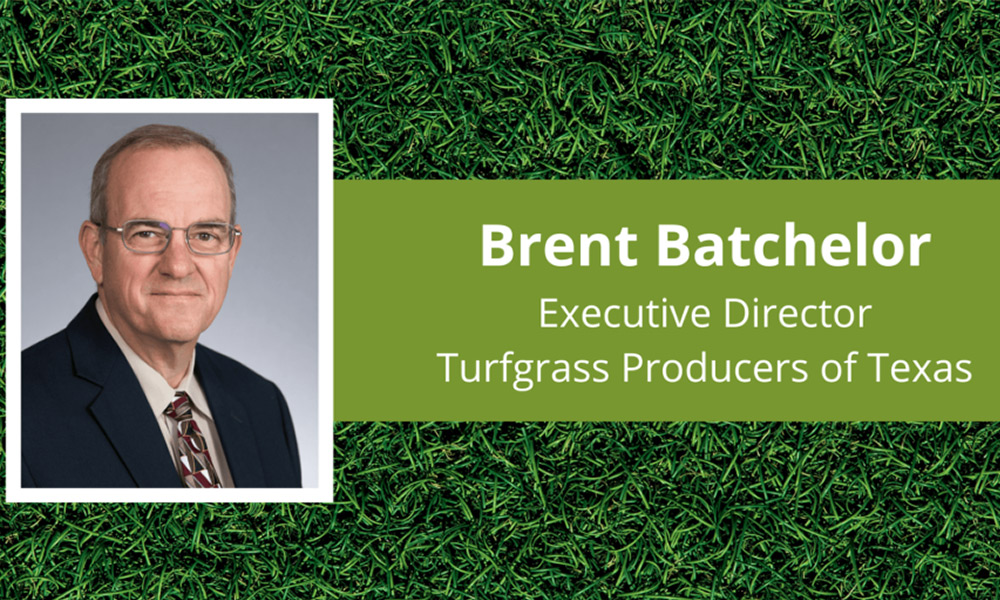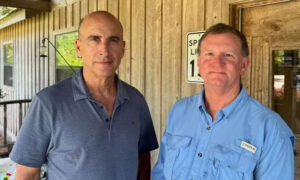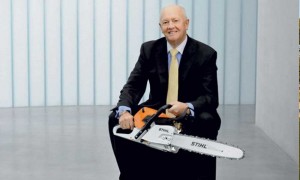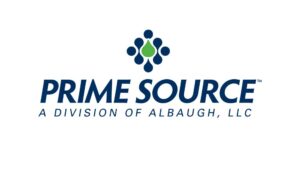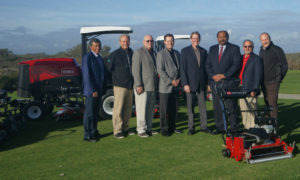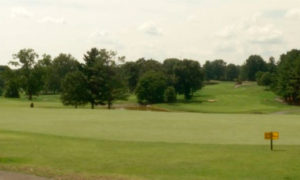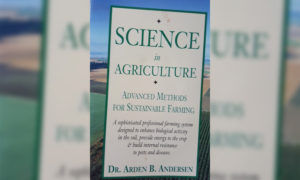The upbringing of the person in charge of the Turfgrass Producers of Texas (TPT) is not very different from many of the sod producers he works with on a regular basis. TPT’s Executive Director, Brent Batchelor, grew up on a row crop farm in Texas.
The original plan was for Batchelor to take over the Batchelor Family Farm, as a fourth-generation farmer. But, when he graduated high school in 1981, they were in the midst of a major agricultural recession and farms were trying to manage as banks were changing hands as a result of several bank failures that year.
Batchelor said his father salvaged the farm with alternative financing and after he got out of debt, he farmed it himself for another 20 years. The farm actually expanded and his parents and brother still lease some of the farmland and run a fairly large cattle operation on the property, but they no longer grow row crops.
He graduated from Texas A&M with a Bachelor’s in Animal Science and went on to work for the Extension Service in Texas which is now Texas A&M AgriLife Extension Service, the state’s premier consumer education and outreach agency in agriculture, natural resources and the life sciences.
For the last 35 years, Batchelor has served as a county extension agent, with two decades of that time dedicated to Matagorda County, which houses multiple turfgrass producers. In addition, he holds a concurrent role with the TPT.
John Cosper, TPT’s first executive director, recruited Batchelor to offer continuing education units for the growers so they could keep their pesticide applicator licenses. “That’s how I first started working with the association and I’d help them every year with the annual meeting and started doing more with the board.”
When Cosper and his wife Diana decided they didn’t want to run TPT anymore, they approached Batchelor to take it over. He got permission from the extension to help part-time and in August 2015, Batchelor became the Executive Director of the TPT.
Turfgrass Producers of Texas
In this role, Batchelor manages accounting and Quickbooks for the organization, oversees membership for both grower and affiliate members and he makes sure the board meets regularly while maintaining good records.
“That’s obviously the functional part of the job, but not the part I enjoy. I enjoy working with the growers as a group and individually. Hearing their stories and working with them on issues they think are important to them,” he shared. “I am responsible for compiling articles and information for our quarterly newsletter, which is distributed via mail to keep our members informed about the latest developments in our industry. Through this platform, I ensure that our members are up-to-date on critical issues and opportunities for engagement, such as commenting on USDA regulations or organizing meetings with other entities to address any concerns with local ordinances.”
Batchelor said they share a legislative person with the Texas Nursery and Landscape Association (TNLA) that keeps them abreast of any issues that turfgrass producers need to be made aware of. He said an example would be a current ordinance under discussion by the city of Austin, TX which he’s helping to mitigate on behalf of the TPT.
He explained the ordinance hasn’t been drafted yet, but the discussions imply it could limit irrigation and turfgrass to 50% of the landscape for new builds. “That’s going to limit turfgrass sales in Austin because if it mandates 50% irrigation and turf that’ll be a sales issue for our growers. We are trying to curve that some and hope to have good results.”

“Truly thanks to Sod Solutions and their efforts to engage the Celebration® Bermudagrass program, that’s when they were able to hire for an executive role to run the association. I believe 2003 was the first annual meeting I was involved with in Bay City, under the direction of Cosper.”
He explained that the annual meeting typically takes place in Bay City every January since it’s a familiar place for most growers to gather. Occasionally the TPT will have a field day when Texas A&M or another entity releases a new grass variety or wants to meet to showcase research coming down the pipeline. They’ll also call meetings if there are specific issues that come up from time to time via Zoom webinars. They’re working on an equipment field day in 2024, but since Texas is so large they have to find a time and location that is convenient for everyone.

TPT consists of a nine-member board that meets every other month. Batchelor works with the board to discuss what they think is important and come up with ideas for what they’d like to see within the industry. “The board is very diverse because some farms may concentrate on growing bermudagrasses for sports fields and they may even do installations and the next grower might just grow St. Augustine for wholesalers. And then there’s a lot in between that are vertically integrated and do more of the retailing and installations and others that are just growers.”
Related: The Lasting Legacy of Vesper Velvet Bentgrass
Batchelor explained a lot of sod producers in Texas started with row cropping and dedicated a little bit of farmland to turfgrass and then grew their business from there. He said there are also a few who came directly in as turf growers that had a background in landscaping or the green industry, rather than from a farming background.
“It’s a different mindset between those two examples and they all have different views of what they think is important,” he said.
TPT also hosts social fundraiser events. In October, they host an annual inshore saltwater fishing tournament that has grown to roughly 30 boats and takes place in Matagorda. Turf producers from across the state bring employees and office staff to the tournament, making for a fun networking opportunity. The organization also hosts an annual golf tournament every November. They’ve grown it to 10 teams of four players and hope it continues to draw a bigger crowd moving forward.

The TPT has a fund that supports research from the breeding end with Texas A&M. “They’re interested in continuing those relationships with the university and other groups that do research and promote turfgrass,” he said.
Related: Doctor Turfgrass aka Dr. Richard Hurley, Does it Again
Future of Turfgrass
Batchelor explained there is a silver lining in any crisis, and for the turfgrass and golf industries in Texas, both saw a mini-boom during COVID. He said this is due in part to the influx of golf people played during the pandemic as well as the number of people who were staying home finding ways to improve their yards.
Over the next 10 years, he anticipates people will continue moving to Texas and the Southeast United States. He said that growers tell him that houses are getting bigger and lawns and lot sizes are getting smaller. “But we still see a strong demand and I don’t see that waning unless we have a big water crisis or something that limits that growth based on regulations. I think we’ll continue to grow for a while,” he said. “I think we’ll continue to see more specialization in the farms and less general growers for wholesalers because of competitiveness.”
He anticipates more consolidation of farms in the future as well because of the economies of scale, and the equipment and labor required to successfully run a farm. He also thinks automated equipment will continue to grow alongside labor issues farms are constantly juggling.
Related: Georgia’s McLemore Golf Club Features Two Top Performing Bermudagrasses
“We’ll continue to keep an eye out for anything that is threatening from an ordinance standpoint and figure out what we are going to do about labor. We spend a lot of time talking about that and educating farms on the H2a programs so they can find harvesters and truck drivers.
There are two things Batchelor said the TPT would like to implement within the next few years. The first would be to start a young leaders program during this generational transition of leadership they’re seeing across many Texas sod farms.
“We want to train leaders within these organizations to know how to advocate for their product and know how to communicate with rule makers, whether they be from a local entity, the state or at a federal level. Just to learn how to interact with that process and how to do that. And we’d like to give them tips and skills to improve their individual operations no matter what their size and targets are. They have to be involved at some point in order to tell that message. A legislative person would much rather hear from constituents than a person being paid to talk to them.”
The second goal in the near future for the TPT would be to create a peer group of growers for the purpose of exchanging ideas to better themselves as well as the industry long-term.
Related: Sod Solutions Professionals Welcomes Craig Potts
The TPT also has intentions for greater outreach to consumers, which they know is a big undertaking and a moving target. “They’re important to us whether they interact with turfgrass in the form of a sports field, a golf course, a home lawn or a municipal area. We want to keep them informed because ultimately they drive the decision-makers and we want to make sure they’re well-informed. For example, that turfgrass doesn’t have to use as much water as a municipality says it uses. And just general education about turfgrass management.”
TPT works with Texas A&M, extension partners and other industry professionals to put out content and resources for homeowners to make sure they’re happy with their products and to make good decisions about management. They also publish the quarterly newsletter with industry-related articles about growers, news and upcoming events.
Family

Batchelor has been married to his wife Kelli for 31 years and she assists him with day-to-day tasks as well as events for the association. They have two children, Ty Batchelor, married to Alexis, and Emma Wilson, married to Beau. Both of their children got married during the pandemic and had babies within a year. Their new grandsons, Dewey Hays Wilson and Reed David Batchelor will both turn one this year.
Brent and Kelli live in Glen Rose, and their children are in Montgomery and Seguin. He has moved into a supervisory position with the extension where he helps with onboarding and programming. When he retires, he and Kelli hope to move somewhere between the two so they can spend more time with them. Batchelor explained that between moving around some with his extension positions, they have always been a close-knit family that enjoys spending a lot of time together.
For more information on the Turfgrass Producers of Texas, click here.

